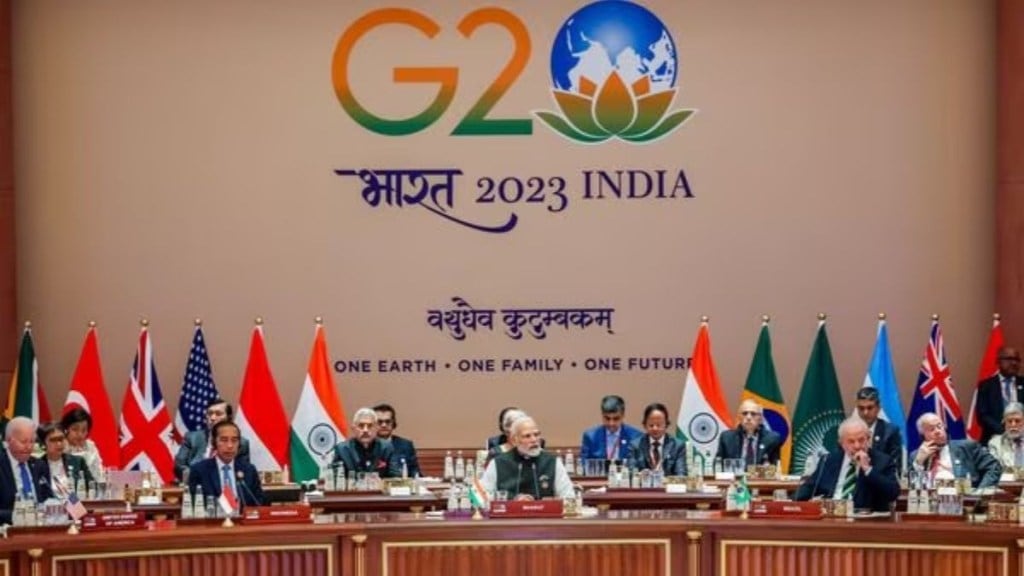Prime Minister Narendra Modi, in his role as the host of the G20 Summit, concluded the two-day event with a prayer for peace, “Swasti Astu Vishwa,” which translates to “may there be peace in the world.” This gesture served as a powerful reminder of the shared responsibility and commitment to global harmony that brought leaders from around the world to Delhi.
In his closing remarks, Prime Minister Modi not only declared the formal end of the G20 Summit but also expressed hope for a future guided by the principles of “One Earth, One Family, and One Future.” These principles encapsulate the essence of the G20 Summit, where leaders came together to address the most pressing global challenges as a united global family with a shared vision of a better future.
Prime Minister Modi’s tenure as the head of the G20 would continue until November 30, with over two and a half months remaining. During this time, India remains dedicated to ensuring the efficient implementation of the suggestions and proposals that emerged during the summit, the PM said in his closing remarks.
Over the course of the two-day summit, world leaders articulated their views, offered suggestions, and presented numerous proposals. Prime Minister Modi underscored the collective responsibility to carefully consider these suggestions and expedite their implementation. He proposed the convening of another virtual session of the G20 by the end of November to review the progress made on the decisions taken during the Delhi summit.
This forward-looking proposal reflects India’s commitment to ensuring that the momentum generated during the G20 Summit is sustained and translated into concrete actions. It also highlights PM Modi’s proactive approach to global challenges, where he seeks to transform ideas into impactful policies.
One of the significant aspects of his concluding remarks was his call for the establishment of a framework for Responsible Human-Centric AI governance. In an era defined by rapid advancements in technology and artificial intelligence, this initiative underscores the importance of setting global standards to regulate AI. It emphasizes ethical AI development, ensuring transparency, protecting privacy, upholding data security, and safeguarding human rights in the age of AI.
His focus on AI governance aligns with the evolving landscape of technology and the need for responsible and accountable practices in this domain. It positions India as a leader in advocating for the ethical and humane development of artificial intelligence.
Furthermore, Prime Minister Modi addressed the growing relevance of cryptocurrencies and digital currencies. He recognized the importance of regulating these digital assets to ensure monetary and financial stability, as well as social order. The G20 Leaders’ Declaration had already paved the way for the regulation of crypto assets, acknowledging the imperative of addressing the challenges posed by the digital currency ecosystem. Prime Minister Modi’s call for early action on regulating crypto assets reflects the global shift towards creating a regulatory framework for this emerging field.
In his remarks, PM Modi also turned his attention to the pressing issue of cybersecurity. He stressed the necessity of global cooperation and the need for a robust cybersecurity framework to counter new channels and funding methods exploited by terrorist organizations in the cyber world. His focus on cybersecurity highlights the multifaceted nature of contemporary security challenges and underscores the importance of international collaboration in addressing them.
Additionally, he highlighted the need to expand the mandate of Multilateral Development Banks (MDBs) and the urgency of implementing effective decisions in this regard. This expansion of MDBs’ responsibilities would contribute to international development and cooperation, aligning with the broader goals of the G20 Summit.
Moreover, Prime Minister Modi touched upon the necessity of reforming the United Nations (UN) to adapt to the rapidly changing global landscape. He emphasized that the UN’s failure to adapt has led to the emergence of effective regional forums that are also proving to be influential. In a world characterized by rapid transformations, his call for UN reforms underscores the importance of ensuring that global governing bodies remain relevant and responsive to contemporary challenges.

